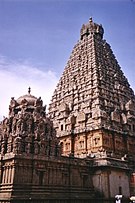| Part of a series on |
| History of Tamil Nadu |
|---|
 |
| Part of a series on |
| Sri Lankan Tamils |
|---|
| Part of a series on the |
| History of Kerala |
|---|
Education was considered important in Ancient Tamil as they considered the mind of the uneducated to be an "abode of darkness". The sangam period of acquiring knowledge was during youth.[1][2]
The rulers and aristocrats of ancient Tamilakam were always conscious of their duties to their country. They considered development of education as an important duty. So the kings and chieftains took all measures for the education of people.[3] Naladiyar one of the Tamil books of Law lauds that "men gathered books in abundance and filled their house with them." They studied science, mathematics, engineering, astronomy, logic and ethics.[4][5]
Education was widespread and there was high standard of literacy. Libraries attached to Jain Pallis and Buddha Viharas promoted education among the people.[citation needed] The Sangam literature makes clear that people irrespective of sectarian or sex considerations were entitled to get the benefits of full education, making the Tamil people one of the earliest civilisations to acquire high female literacy.[6][7]
- ^ Nadarajah, Devapoopathy (1969). Women in Tamil society: the classical period. Faculty of Arts, University of Malaya.
- ^ Object, object. "A History of Education in Tamil Nadu, India".
{{cite journal}}: Cite journal requires|journal=(help) - ^ Pillai, Suppaiah (1994). The Contributions of the Tamils to Indian Culture: Socio-cultural aspects. International Institute of Tamil Studies.
- ^ Subramanian, N. (1979). History of South India. S. Chand.
- ^ Antharjanam, Dr N. Saraswathy (29 July 2022). "Tinai Concept: Aesthetics Of Ancient Tamil Poetics Tolkappiyam". Journal of Positive School Psychology. 6 (8): 779–792. ISSN 2717-7564.
- ^ Nair, Balakrishna (1994). Social development and demographic changes in South India: focus on Kerala. M.D. Publications Pvt. Ltd.
- ^ Kerala District Gazetteers: Trichur. Superintendent of Government Presses. 1962. p. 95.


